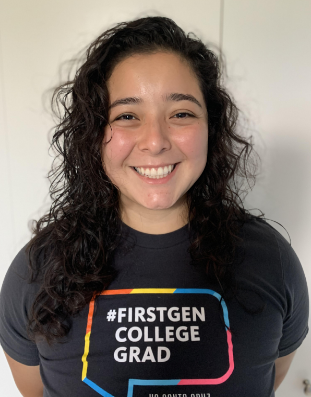First-Gen Alumni: Heddy Menendez (Stevenson '20, Biochemistry and Molecular Biology)

Background: I was born and raised in Echo Park, a small urban neighborhood that sits on the northwestern hills of Los Angeles, California. While these days, the neighborhood is known for its trendy coffee shops and yoga studios, when I was growing up, it served as a haven for Central American immigrants and unfortunately, many latin American street gangs. I was raised by my Spanish speaking, Guatemalan immigrant, single mother. She was frightened by the detrimental effect the gangs around my neighborhood left on the teens and young adults who lived amongst them. So, she taught me the value of education early on in life and would constantly tell me, "No pares de echarlé ganas a tu educación!"
What motivated me to go to college: As a kid, it pained me to see my mom have to work two laborious shifts a day at the nursing home just so my brothers and I could have school supplies and enough food on the table. Unfortunately, my situation has always been much too common in my community. I knew that going to college was a way for me to get my family out of this financial burden and it could lead us to a more financially and mentally stable life. I also wanted to ensure that the next generation of Menendez kids could live a more secure life.
What's the biggest challenge you encountered as a first-gen student and how did you overcome it?: The biggest adversity I faced was being left behind in my science classes. I entered college as a business major and had very little science background. As a result, I struggled with keeping my grades afloat in my STEM classes (and even failed a few) my first couple of years at UCSC. Luckily, I was able to find resources such as the Academic Excellence Program (ACE), and later on STEM Diversity Programs, to help foster my success as a Biochemistry major and as a scientist.
How has your background helped you?: My background has helped bring in a new perspective into my work as a Biochemist. As a kid, I dealt with a lot of health, financial, and community based adversities that taught me how to think under pressure. This tough lesson has proved advantageous in my scientific work as I think of rationale for my experiments and research projects. My identity and background has also helped to ground me. Seeing a first-generation Latina is uncommon in science, so I feel very proud to be able to represent my heritage and my community.
What would you tell my first-year self now?: I would tell myself to seek out resources early on in college. The communities that I became a part of at UCSC helped to foster my success. So, I would recommend to myself and to any first-gen student to get involved with your local organizations. For me, I found the best communities at ACE, STEM Diversity, and the Society for the Advancement of Chicanos/Hispanics and Native Americans in Science (SACNAS). They helped me with tutoring, paid internships, job opportunities, paid travel to science conferences, and I made several life-long friends. To me, the diverse communities at UCSC are invaluable and I will remember the impact that they have left on me for the rest of my life.
What was the best thing about your college experience?: Meeting other students who came from different backgrounds! Although at first it was intimidating to meet someone that looked different from the people within the community I had grown up in, I learned to really appreciate the kindness and friendship that people of all backgrounds have to offer. I've met some of the most amazing, driven, and compassionate people at UCSC and I just wish I had overcome my shyness earlier!
How being a first-generation student has influenced me: Being a first-gen student has given me a new level of confidence in everything that I do. In the beginning, I was really intimidated by those who knew more than me in my classes and at my work. However, now I've proven to myself that I am indeed smart and fully capable of achieving anything I set my mind to. I am currently interviewing for graduate school to pursue my Doctoral degree in Biomedical Sciences. In these interviews, I can't help but feel proud that I, a young poor girl from Echo Park, is sitting amongst doctors, presenting her science, and interviewing alongside students who come from wealthier communities, ivy league schools, and highly educated parents.
